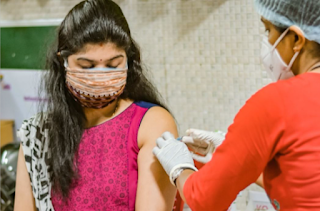JERUSALEM: Israel's new government decided to deal with the fourth wave of COVID-19 pandemic without imposing lockdowns, after witnessin...
JERUSALEM: Israel's new government decided to deal with the fourth wave of COVID-19 pandemic without imposing lockdowns, after witnessing the hurting to the economy caused by the previous three lockdowns in one year.
"There are certain preventive measures that we need to take," Dr. Roy Grosu, Dan district medical director at Clalit HMO, told Xinhua "we believe that given a booster shot of COVID-19 vaccine would most definitely be the major cause of cases going down."
Israel was the first country in the world to embrace booster shots by launching in July a sweeping nationwide campaign to inoculate with third dose all of its population over the age of 12.
Many countries around the world, including those with a high rate of vaccination, are witnessing a resurgence of COVID-19 cases and deaths.
Among possible reasons for the increase in infections and hospitalizations are the Delta variant and his new sub-variant AY.4.2, as well as possible waning of immunity over time of people vaccinated with two doses.
Some countries have been following Israel in launching booster vaccination campaigns, meanwhile, some other countries focus on giving third jabs to the elderly and people at risk.
In Israel, almost four million people agreed to get the booster, while about three million citizens over age 12 still didn't receive the booster, and 700,000 of them didn't even get their first shot of the vaccine.
Israeli government announced a decision at the beginning of October that the vaccinated status of its citizens who didn't agree to receive the third shot of vaccine, and their second shot was older than half a year, will be canceled.
Yet, the fear of losing vaccination passports forced many Israelis to take the third jab despite the concerns some of them had about it. While there was complete consensus about the first two doses, the third one was more controversial, apparently.
Eligible people that refuse to take booster shots are banned from some basic daily life activities in Israel, including eating inside restaurants or entering almost any venue, and they also must be in quarantine for two weeks when coming back from abroad.
Grosu noted that "we need to take under consideration that it might come to giving away fourth booster shots until we can trust the immune system in our body and the technology to give us a long-lasting immunity."
Dr. Yael Reichenberg, general director of Dan district at Clalit HMO, stressed that besides the "critical and very important" role of booster shots, other measures helped as well to tackle the fourth wave.
"The tools we have to deal with these challenges are the same tools with the first wave, the second wave, the third wave, the fourth wave, and the fifth wave if, unfortunately, it will arrive," said Reichenberg.
Prevention, identification, isolation, best treatment, and vaccination are the tools to prevent the outbreak, she said, emphasized that "prevention is rule number one."
It means to "take care of the hygiene of your hands, wearing a mask, and listening to all the instructions of the medical staff," Reichenberg said in an interview with Xinhua.
As for vaccinating children under 12, Israel is expected to wait at least a few weeks before authorizing vaccination of young children from 5 to 11 years old.
"We know now that children are main cause of morbidity, and we're trying best to encourage, not force, the children to get vaccinated," stressed Grosu.
-News Feed














COMMENTS